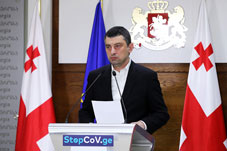
5 business associations request Georgian government to fulfill their recommendations
By Natalia Kochiashvili
Thursday, April 16
The 5 business unions, in consultation with economic experts, developed recommendations and called on the government to implement them quickly. The list of recommendations includes the suspension of a number of taxes (income and property taxes, pension contributions) for 6 months and the deferral of VAT payments from customs clearance to the stage of its sale.
Alexander Ratishvili, President of the Georgian Taxpayers’ Union, one of the signatories of the petition, said in the interview with RFE/RL that the co-authors of the document include large, medium and small business organisations in almost all sectors and directions operating in Georgia, ‘the vast majority of businesses.’
According to Ratishvili, the fight against COVID-19 in the healthcare sector is going well, however, as far as the economy is concerned, he sees more risks and on behalf of the currently operating businesses expresses desire to be involved in solving and planning all the areas that are called to minimise economic problems.
Among the recommendations of the business unions, the first concerns the lifting of the obligation to pay VAT in advance when customs clearance of imported goods. In order for operating businesses that supply the country with food and other primary consumer goods to continue functioning the cash flow is vital, and with the requirement to pay VAT as soon as possible, these funds are withdrawn. As a result it becomes harder to keep funds and jobs and not force people to leave either temporarily on unpaid leave, or at all.
“Our demand is that this ‘yellow corridor’ be abolished and that the VAT commitment be made at least 45 days after the goods are brought into the Georgian trade space and the sale of these goods begins,” Ratishvili said, explaining that VAT should be paid based on the sale and not immediately at the border.
While working on the recommendations, the initiators thought that the requested benefits would reduce budget revenues, but concluded that without these steps, the losses would be much greater and it would be more difficult to revive the economy in the post-crisis period.
Ratishvili hopes that other ways to make up for the shortfall of reduced taxes can be found. According to him, the resource is within the budget, which needs to be adjusted adequately, and this needs to be done by ‘mobilizing maximum funds from international financial institutions.’ He added that it concerns ? 2 billion, which can be deducted from the budget by suspending mentioned taxes.
The president of the Georgian Taxpayers’ Union thinks that if the government does not take into account the position of business unions and if radical measures are not taken, the country will face catastrophe in 2 or 3 months, speaking separately from the national currency exchange rate, which appears to be another major challenge.
Unemployment, bankruptcy of most companies, suspension, grown gaps, drastically reduced purchasing power of now unemployed population, declined demand and stagnated economy is what the country might be facing in not so long term future, and Ratishvili says it will require much more resources and effort, than what is on the agenda today.
“The specificity of today's economic crisis is that both supply and demand are declining simultaneously. This is a disaster for the economy,” he said, adding that international experts do not remember such a crisis since WWII.
In this regard, it’s interesting what the Prime Minister of Georgia, Giorgi Gakharia said about the business and social assistance at a briefing on April 14th, when he announced the closure of 4 major cities in Georgia (Tbilisi, Kutaisi, Batumi & Rustavi), as well as the extension of quarantine before May 10th , the decision that envelopes certain outcomes for economy and businesses.
According to the PM, the first obligation of the state is to help those who lost their jobs and this will be the main direction of assistance in the crisis. He added that the government will start providing targeted assistance to companies, who have not fired employees as soon as the government sees the contours to exiting the post-crisis.
The Prime Minister also assured that even though neither the gov’t nor the companies have the time for that right now, all businesses that fired employees without compensating the salaries that workers deserved, will face the responsibility, adding that those companies have not only the obligation to address the government for assistance but also the obligation to employees.
“When workers are fired because of a crisis, the company has a direct legal obligation to pay them for several months and everyone should remember this, because after the crisis ends, we will take care of everyone,” PM said, calling on companies to consider social responsibility.
Gakharia reiterated that Georgia has very limited resources for direct assistance and that the government considers its task to be supportive and economical in terms of spending.
He also emphasized that number one goal now due to the health interests is to limit the mobility and movement of citizens in the country, and when asked about the topic of online shopping, which has been stopped, he responded - “the task now is not to encourage trade, but to limit the speed with which the virus can spread.”


